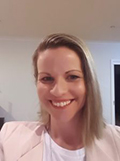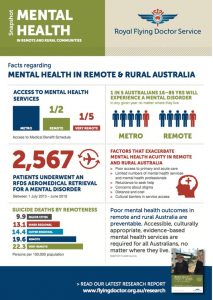In this episode we talk about why your General Practitioner (GP) can be the most important person if you’re struggling with your mental health. While the stigma around mental health is improving, wanting to be resilient in times of distress can stop us all reaching out for help.
 Hayley Purden is a volunteer speaker for beyondblue, a national organisation that works to raise awareness about anxiety and depression, reduce the associated stigma and encourage people to get help.
Hayley Purden is a volunteer speaker for beyondblue, a national organisation that works to raise awareness about anxiety and depression, reduce the associated stigma and encourage people to get help.
Hayley became a beyondblue speaker to share her experiences with depression and anxiety in the hope of starting conversations in social groups, workplaces and everywhere in between on the importance of identifying symptoms of mental health conditions in peers, colleagues and friends.
 Dr Sonja Kauffman completed her medical degree at the University of Sydney. Having worked at Royal Prince Alfred Hospital and Wollongong Hospital, Sonja relocated to the Central West of NSW to complete her General Practice training and obtain Fellowship of the Royal Australian College of General Practitioners.
Dr Sonja Kauffman completed her medical degree at the University of Sydney. Having worked at Royal Prince Alfred Hospital and Wollongong Hospital, Sonja relocated to the Central West of NSW to complete her General Practice training and obtain Fellowship of the Royal Australian College of General Practitioners.
Having already completed postgraduate training in Family Planning and Child Health, Sonja realised the need to develop her skills in managing mental health conditions. This was primarily due to the large volume of patients she was seeing with these conditions and the limited resources in rural and regional Australia. The mental health of patients living in rural and regional Australia is now one of the elements of her work she is most passionate about.
 Peter Spence is interim general manager at The NSW Outback Division of General Practice Limited (ODGP). ODGP is a Primary Health Care provider working to improve the health of people living in the local government areas of Walgett, Brewarrina, Bourke and Cobar.
Peter Spence is interim general manager at The NSW Outback Division of General Practice Limited (ODGP). ODGP is a Primary Health Care provider working to improve the health of people living in the local government areas of Walgett, Brewarrina, Bourke and Cobar.
The ODGP manages a variety of primary health care programs focusing on early intervention and prevention of chronic diseases, chronic disease management, lifestyle modification and health promotion programs.
Talking to your GP
Talking to a general practitioner (GP) is a good place to start when you’re looking for help and advice about your mental health. They’re trained to assist with both mental and physical health problems and can tell you where you can find help and support. If you’re worried about your mental health here’s what you can do:
Book it in: Contact a GP practice to make an appointment. It can be hard if you’re in a small town and there aren’t many doctors, but it’s important to remember that they are bound by confidentiality and can’t share your information without your consent, except in the very rare circumstance that your life, or the lives of others, are at risk.
Prepare: Think about what you might like to talk about. It can be helpful to write a few things down or take a family member or friend along with you for support.
Show up: Talking about your mental health for the first time can be tough, but be honest with your doctor, they’re there to help.
Reflect and Take Action: Think about what you and your doctor discussed. Make sure to act on what you decide; fill your script, join the walking group or make that appointment with the counsellor.
For more detailed information on seeing a GP about your mental health, read our Seeing Your GP (312 KB).
You can also find more information in our downloadable fact sheets below:
- Finding a Mental Health Professional (355 KB)
- Online Help for Mental Health Concerns (359 KB)
- (556 KB)
- Where To Find Help (533 KB)
Being familiar with health services in your area and other online support will help you prepare for when they are needed. Print or save our list of online resources Online Help for Mental Health Concerns (359 KB) or telephone services (556 KB) or list of useful directories and keep them handy. It can also help to find out what’s available in your local area and keep these in mind too.

The Royal Flying Doctor Service provides regular fly-in fly-out GP, Nursing and Allied Health Clinics to rural and remote communities. RFDS supported over 2,500 with a mental disorder between 2013-16. A new partnership with Lives Lived Well (Previously Lyndon) will see three Alcohol and other Drug (AoD) outreach services established in Cobar, Dubbo and Broken Hill.
Other clinics in rural areas are taking an integrated approach to supporting people who have mental health problems.
Help services
If you or someone else is in immediate danger, call 000 or go to your nearest hospital emergency department.
If you’re concerned about your own or someone else’s mental health, you can call the NSW Mental Health Line 1800 011 511 for advice.
Having a tough time and need someone to talk to right now? The following services are here to help. They are confidential and available 24/7.
- Lifeline – 13 11 14
- Men’s Line Australia– 1300 78 99 78
- Kids Help Line – counselling and support provided for young people (to 24 years old) who are feeling depressed, sad, or lonely – or just need someone to talk to – 1800 55 1800
- Domestic Violence Line – 1800 656 463
- Suicide Call Back Service– 1300 659 467
